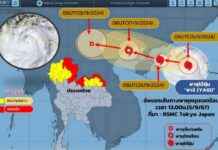Thailand’s Bid for Major Event Cancelled Due to Unmet Obligations
The Asian Indoor and Martial Arts Games (Aimag), originally scheduled to take place in Bangkok and Chonburi from November 21-30, have been cancelled by the Olympic Council of Asia (OCA). This decision was confirmed by the Sports Authority of Thailand (SAT) Governor, Dr. Gongsak Yodmani, who received an “urgent” email from the OCA citing the non-availability of funds and time constraints as the primary reasons for the cancellation.
The announcement came as a shock to many, especially considering Thailand’s rich history of hosting major sporting events. The OCA’s decision to cancel the Aimag was based on the organizing committee’s failure to meet the criteria outlined in the Host City Contract by the specified deadline of August 19, 2024.
According to a report published on the OCA website, the Aimag Organizing Committee had assured the OCA during the 43rd OCA General Assembly in Bangkok on May 11, 2024, that all necessary requirements would be met by July 2024. However, it became evident that the committee was unable to fulfill its obligations, leading to the cancellation of the event.
The OCA Executive Board unanimously agreed to cancel the Aimag after it became clear that the organizers were unable to meet the nine conditions required to ensure the successful hosting of the Games. Despite this setback, the OCA has left the door open for Thailand to host the tournament in the future, with a possibility of applying to host the event after the 2026 edition in Riyadh, Saudi Arabia.
The decision to cancel the Aimag came after the event had been rescheduled multiple times due to the Covid-19 pandemic and changes in the Thai government. The uncertainty surrounding the event’s fate had been a cause for concern among athletes and officials alike.
Chaiyapak Siriwat, Vice-President of the National Olympic Committee of Thailand and head of the Aimag organizing committee, had previously raised concerns about the country’s financial constraints in hosting the event. The decision to reduce the number of sports included in the Games had also raised eyebrows within the Asian sports community.
The cancellation of the Aimag serves as a reminder of the challenges faced by host countries in organizing major sporting events. The financial burden, logistical hurdles, and time constraints all play a crucial role in determining the success of such endeavors.
Moving forward, it is essential for Thailand to address the issues that led to the cancellation of the Aimag and work towards fulfilling the necessary requirements for hosting international sporting events. By learning from this experience, Thailand can position itself as a reliable and capable host for future tournaments.
Impact of the Cancellation
The cancellation of the Aimag has far-reaching implications for Thailand’s sports industry and reputation as a host nation. The decision not only reflects poorly on the country’s ability to meet its obligations but also raises questions about its financial stability and commitment to hosting international events.
The loss of the Aimag is a significant blow to Thailand’s sporting community, as it deprives athletes of the opportunity to compete on home soil and showcase their talents to a global audience. The event would have provided a platform for athletes to excel and gain valuable experience in a competitive environment.
Furthermore, the cancellation of the Aimag has financial repercussions for Thailand, as the country had already invested resources in preparing for the event. The sudden decision to cancel the Games has left organizers scrambling to recoup their losses and find alternative ways to utilize the resources that had been allocated for the Aimag.
In addition, the cancellation of the Aimag raises concerns about Thailand’s future prospects as a host nation for major sporting events. The inability to meet the requirements set by the OCA has damaged Thailand’s reputation and credibility in the eyes of the international sports community.
Lessons Learned
The cancellation of the Aimag serves as a valuable lesson for Thailand and other aspiring host nations. It underscores the importance of careful planning, financial stability, and effective communication in successfully organizing major sporting events.
Thailand must take this opportunity to reflect on the factors that contributed to the cancellation of the Aimag and identify areas for improvement. By addressing these issues proactively, Thailand can enhance its capabilities as a host nation and regain the trust of international sports organizations.
Moving forward, Thailand should prioritize transparency, accountability, and collaboration in its efforts to host future sporting events. Clear communication channels, realistic budgeting, and efficient resource management are essential components of successful event organization.
Future Prospects
Despite the setback of the Aimag cancellation, Thailand remains a promising candidate for hosting future sporting events. The country’s vibrant sports culture, world-class facilities, and enthusiastic fan base make it an attractive destination for international competitions.
By learning from the mistakes of the past and implementing effective strategies for event organization, Thailand can position itself as a reliable and capable host for major sporting events. The OCA’s willingness to consider Thailand as a future host for the Aimag is a positive sign that the country still has the opportunity to showcase its capabilities on the international stage.
In conclusion, the cancellation of the Aimag serves as a wake-up call for Thailand and other countries seeking to host major sporting events. By addressing the challenges that led to the cancellation and adopting a proactive approach to event organization, Thailand can overcome this setback and emerge as a successful host for future tournaments.




















